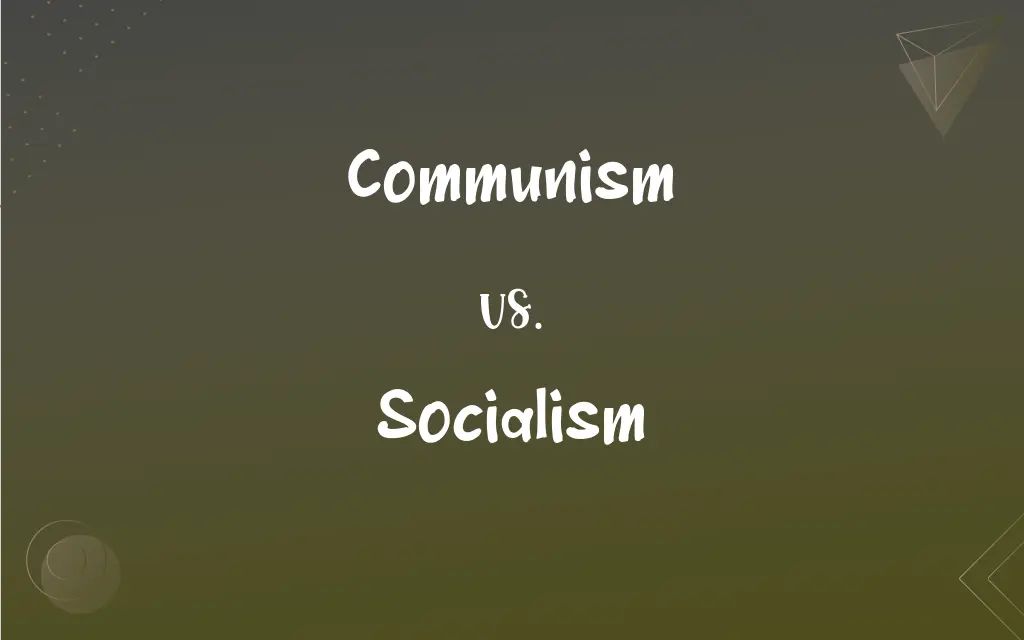Communism vs. Socialism: What's the Difference?
Edited by Janet White || By Harlon Moss || Updated on October 3, 2023
Communism advocates for a classless, stateless society and common ownership of all means of production. Socialism seeks social ownership and workers' self-management within a market or planned economy.

Key Differences
Communism is often visualized as a political and economic ideology where every aspect of societal functioning is controlled by the state, with an aim to achieve a classless society. Socialism, while also aspiring to equitability, allows for varied frameworks where aspects like private ownership can exist, albeit with regulatory oversight and a strong welfare state. Both theories are based on cooperative governance but diverge in methodologies and implementation strategies.
In communism, the absence of social classes and distinction in wealth or power is crucial, advocating for collective ownership of production means, thereby erasing capitalist structures. Socialism may permit private enterprises but emphasizes equal distribution of wealth and income, maintaining that while individual ownership can exist, large-scale industries or segments crucial for survival should be collectively owned or controlled by the state.
While communism fundamentally opposes capitalist structures and envisions a revolutionary shift towards its model, socialism might seek to operate within a capitalist framework, ameliorating its flaws with socially focused policies. Socialism’s approach often implies working through existing structures to implement policies that decrease socio-economic disparities, as opposed to completely dismantling the existing institutional frameworks.
From a historical standpoint, communism as visualized by leaders like Lenin or Mao sought rapid transformation towards a proletarian rule, often utilizing stringent and sometimes oppressive measures to suppress opposition. In contrast, socialism, observed in nations like Sweden, can function within democratic frameworks, employing social welfare and egalitarian policies while respecting civil liberties and democratic norms.
Comparison Chart
Definition
A socio-economic system advocating for a classless, stateless society and common ownership of production means.
An economic system advocating for collective or governmental ownership and administration of production and distribution means.
ADVERTISEMENT
Private Property
Generally not allowed.
Allowed but may be regulated.
Wealth Distribution
Equally distributed among citizens.
Distributed based on both need and contribution.
Political Structure
Often associated with a single-party state.
Can exist within various political structures, including democracy.
Examples
Soviet Union, Cuba.
Sweden, Denmark.
Communism and Socialism Definitions
Communism
A political theory advocating for a society in which all property is publicly owned.
Communism in the Soviet Union sought to eliminate class disparities.
ADVERTISEMENT
Socialism
An ideology seeking to balance individual and collective interests in societal structuring.
Through socialism, governments might implement policies to alleviate economic disparities.
Communism
A theory promoting communal control over production and resources.
Under communism, the distribution of wealth and resources is regulated by the state.
Socialism
An economic theory advocating for social ownership of production means.
Socialism often aims to prevent excessive wealth accumulation in the hands of a few.
Communism
A system where all citizens have equal status, wealth, and opportunities.
Communism attempts to dissolve economic and social stratification.
Socialism
A social and economic doctrine that calls for public rather than private ownership or control of property and natural resources.
Socialism typically prioritizes public welfare and might allow for private enterprise.
Communism
A social structure where the state controls all means of production.
In communism, individual businesses are often non-existent.
Socialism
A system promoting governmental control over economy and wealth distribution.
In socialism, the state might regulate industries to ensure fair practices.
Communism
An ideology that seeks to establish a classless, stateless society.
Marx envisioned a global revolution leading to communism.
Socialism
A political and economic theory where production, distribution, and exchange are owned or regulated by the community.
Socialism can seek to manage wealth distribution without eliminating private ownership.
Communism
A theoretical economic system characterized by the collective ownership of property and by the organization of labor for the common advantage of all members.
Socialism
Any of various theories or systems of social organization in which the means of producing and distributing goods is owned collectively or by a centralized government that often plans and controls the economy.
Communism
A system of government in which the state plans and controls the economy and a single, often authoritarian party holds power, claiming to make progress toward a higher social order in which all goods are equally shared by the people.
Socialism
The stage in Marxist-Leninist theory intermediate between capitalism and communism, in which the means of production are collectively owned but a completely classless society has not yet been achieved.
Communism
The Marxist-Leninist doctrine advocating revolution to overthrow the capitalist system and establish a dictatorship of the proletariat that will eventually evolve into a perfectly egalitarian and communal society.
Socialism
Any of various economic and political theories advocating collective or governmental ownership and administration of the means of production and distribution of goods.
Communism
Any far-left political ideology or philosophy advocating holding the production of resources collectively, especially by seizing it through revolution.
Socialism
A system of social and economic equality in which there is no private property.
Communism
Any political social system that implements a communist political philosophy.
Communism
The international socialist society where classes, money, and the state no longer exist.
Communism
A scheme of equalizing the social conditions of life; specifically, a scheme which contemplates the abolition of inequalities in the possession of property, as by distributing all wealth equally to all, or by holding all wealth in common for the equal use and advantage of all.
Communism
A form of socialism that abolishes private ownership
Communism
A political theory favoring collectivism in a classless society
FAQs
Can communism or socialism adapt to technological advancements?
Yes, both can integrate technological advancements, potentially adapting their policies accordingly.
What is the primary goal of communism?
Communism aims for a stateless, classless society where all means of production are communally owned.
What are some examples of communist countries?
Historical and current examples include the Soviet Union and Cuba, respectively.
Which countries practice socialism within a democratic framework?
Nations like Sweden and Denmark practice socialism within a democratic framework.
Do communism and socialism value individual freedoms?
Communism may restrict individual freedoms to achieve communal goals, while socialism can uphold individual freedoms.
How do communists and socialists view global relations?
Communism often seeks global proletarian solidarity, while socialism’s approach to global relations can vary widely.
Can socialism coexist with capitalism?
Yes, socialism can coexist with capitalism, often implementing social policies within a capitalist framework.
Can small businesses exist in socialist economies?
Yes, socialism allows for small businesses but often with regulatory oversight.
How do socialism and communism view class structure?
While socialism aims to reduce class disparities, communism seeks to eliminate class structures altogether.
How do communism and socialism approach unemployment?
Both systems aim to address unemployment through state interventions, with varied strategies.
How is education treated in communism vs. socialism?
Both typically advocate for public education, though socialism might allow private educational institutions.
Why is communism often associated with authoritarianism?
Historically, some communist leaders have employed authoritarian means to achieve and maintain a communist state.
What are common misconceptions about socialism?
Common misconceptions include equating socialism entirely with communism or believing it's incompatible with democracy.
How is wealth distributed in a socialist economy?
In socialism, wealth is distributed based on a blend of individual contribution and societal need.
Can private property exist in communism?
Typically, private property is abolished in communism in favor of collective ownership.
How is healthcare managed in socialist and communist systems?
Both systems often provide public healthcare, with socialism potentially allowing private options.
Why do communist symbols often feature a hammer and sickle?
The hammer and sickle represent unity between industrial and agricultural laborers in communism.
Is economic inequality present in socialism?
Socialism aims to significantly reduce economic inequality but doesn’t necessarily eliminate it.
Do all socialists advocate for revolution?
No, some socialists pursue gradual change within existing political frameworks.
Are there different forms of socialism?
Yes, socialism has varied forms, such as democratic socialism, and can adapt to different political contexts.
About Author
Written by
Harlon MossHarlon is a seasoned quality moderator and accomplished content writer for Difference Wiki. An alumnus of the prestigious University of California, he earned his degree in Computer Science. Leveraging his academic background, Harlon brings a meticulous and informed perspective to his work, ensuring content accuracy and excellence.
Edited by
Janet WhiteJanet White has been an esteemed writer and blogger for Difference Wiki. Holding a Master's degree in Science and Medical Journalism from the prestigious Boston University, she has consistently demonstrated her expertise and passion for her field. When she's not immersed in her work, Janet relishes her time exercising, delving into a good book, and cherishing moments with friends and family.
































































